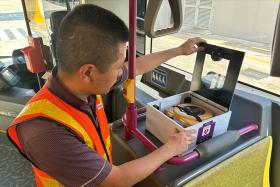Grab to be the only ridesharing app, following Uber merge
Grab's acquisition of Uber prompts LTA to study impact ensure 'no single player dominates sector'
Grab's acquisition of rival Uber's South-east Asian business has raised concerns that ride-hailing services in Singapore could become a monopoly.
The lack of competition could have far-reaching effects for drivers in terms of earnings and commuters who may have to play higher fares.
Regulators quickly moved yesterday to address these concerns, with the Land Transport Authority (LTA) saying it would study the impact of the merger and ensure that "no one single market player dominates the sector to the detriment of commuters and drivers".
The LTA also noted in its statement that the Competition Commission of Singapore (CCS) has the power to review mergers that might affect competition in any market here.
Its spokesman added: "Separately, we are reviewing the regulatory framework, to license the private-hire car (PHC) booking service operators.
"The strategic intent is to keep the PHC and taxi industries open and contestable."
In a separate statement, the CCS said competition laws here prohibit mergers that may result in a "substantial lessening of competition".
If this seems to be happening, the CCS said it could "require the merger to be unwound or modified", and it could also impose "interim measures" before making up its mind.
Grab said in a press release that it would be making a merger notification to the CCS. But a CCS spokesman told The New Paper yesterday evening it had not received notification and is writing to Grab and Uber for clarification.
Under the terms of the merger announced yesterday, Uber will give up its ridesharing and food delivery businesses in South-east Asia in exchange for a 27.5 per cent stake in Grab.
Calling the acquisition the "beginning of a new era", Grab co-founder and group CEO Anthony Tan said: "The combined business is the leader in platform and cost efficiency in the region."
Grab said that Uber's operations will be integrated into Grab's current platforms, including its GrabFood app due to be launched soon.
The Uber app will operate for two more weeks and UberEats will run till the end of May.
Grab will work with Uber to migrate Uber drivers and riders, UberEats customers and merchant partners to its platform.
Transport economist Walter Theseira of the Singapore University of Social Sciences said the merger could mean that Grab has "complete control" over who decides to be a ridesharing driver.
"If they blacklist you, you are effectively out of a job. Traditionally, the regulator has played this role, but now Grab has complete control and has the authority to strip drivers of their source of income," said Dr Theseira.
Professor Lee Der-Horng, a transport researcher at the National University of Singapore, said Grab may see less need to recruit, retain and reward drivers.
"Grab no longer needs to grow its market share and compete for drivers. So in terms of incentives for drivers, they will not be as strong as they were previously," he said.
Both experts also expect commuters to pay more for their rides as a result of the lack of competition.
They said that Grab would see less need to use incentives and promotional codes to attract customers.
Mr Reggie Lim, the 52-year-old head of environment, health and safety assurance at Lendlease Asia who regularly uses Uber, said he was "sad" to hear of the takeover.
"The ease of use, professionalism of service and level of comfort provided by Uber is pleasing," he said, adding that he was unsure if Grab can match this level of service.
FOR MORE, READ THE STRAITS TIMES TODAY
Get The New Paper on your phone with the free TNP app. Download from the Apple App Store or Google Play Store now



